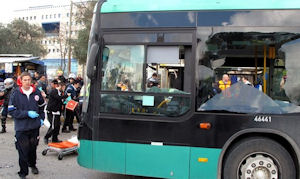 A bomb exploded at a crowded bus stop in central Jerusalem on Wednesday afternoon, killing a British woman and wounding at least 30 people, many of them gravely. It was the first terrorist attack of its kind in the city since 2004. The blast could be heard throughout the Israeli capital and blew out the windows of two crowded buses. The leadership of the World Jewish Congress harshly condemned the attack. “It is appalling to see that once again, innocent Israeli men, women, and children have been deliberately targeted by terrorists. We hope that today's terrorist attack does not mark a return to the days of a Palestinian terror war, and we strongly urge the Palestinian Authority and the international community to stop extremists from causing more death and destruction in Israel and elsewhere,” declared Ronald S. Lauder, president of the World Jewish Congress.
A bomb exploded at a crowded bus stop in central Jerusalem on Wednesday afternoon, killing a British woman and wounding at least 30 people, many of them gravely. It was the first terrorist attack of its kind in the city since 2004. The blast could be heard throughout the Israeli capital and blew out the windows of two crowded buses. The leadership of the World Jewish Congress harshly condemned the attack. “It is appalling to see that once again, innocent Israeli men, women, and children have been deliberately targeted by terrorists. We hope that today's terrorist attack does not mark a return to the days of a Palestinian terror war, and we strongly urge the Palestinian Authority and the international community to stop extremists from causing more death and destruction in Israel and elsewhere,” declared Ronald S. Lauder, president of the World Jewish Congress.
WJC Secretary General Designate Dan Diker added: “Today, Jews throughout the world stand shoulder to shoulder with the people of Israel, who are again coming under deadly fire by those who want to destroy them. As any other nation, Israelis have a right to live in peace and security. The World Jewish Congress calls on the Palestinian Authority leadership to stop the on-going incitement to hatred of Israel and the Jewish people, which is a primary cause of these terrorist attacks.”
Meir Hagid, one of the bus drivers, said he heard a loud explosion as he drove by the site, located near the main entrance to Jerusalem and its central bus station. “I heard the explosion in the bus stop,” he said. He halted his vehicle and people got off. He said nobody in his bus had been hurt. Large numbers of police and ambulance forces were on the scene.
Israel's Internal Security Minister Yitzhak Aharonovitch told journalists that the bomb "was inside a bag which was left at the bus stop." The Egged bus 74 was hit as it stopped to pick up passengers at a stop between the Central Bus Station and the Jerusalem International Conference Center, both of which lie at the western entrance of Jerusalem. The city's mayor, Nir Barkat, said his main concern was that this attack could happen anywhere. He called the incident a "cowardly terrorist attack."
 Jerusalem suffered dozens of suicide bombings that targeted buses and restaurants during the Second Intifada (Palestinian uprising) after 2001, but the attacks halted in recent years. The bombing came amid rising tensions between Israel and Hamas, which has killed and injured hundreds of Israelis in suicide bombings and other attacks in recent years.
Jerusalem suffered dozens of suicide bombings that targeted buses and restaurants during the Second Intifada (Palestinian uprising) after 2001, but the attacks halted in recent years. The bombing came amid rising tensions between Israel and Hamas, which has killed and injured hundreds of Israelis in suicide bombings and other attacks in recent years.








